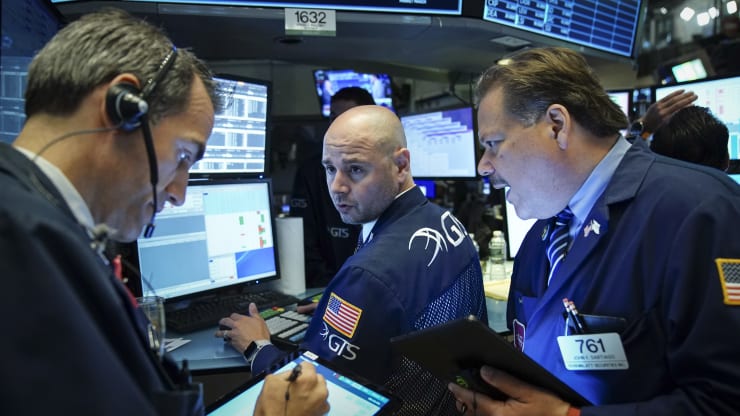
There’s a shift underway in the stock market that may be signalling that some investors believe there was way too much pessimism on Wall Street this summer, and the stocks that do better in an improving economy are the ones to buy for now.
Big banks such as JP Morgan and Bank of America were higher Tuesday, as were cyclical names like Caterpillar and Deere, while growth names like Microsoft, Intuit, Adobe, Pay Pal and Visa were lower.
The cheapest stocks, those with the lowest price-to-earnings ratios were snapped up, while many of the most expensive companies, or those with the highest price to earnings ratios, were being sold.
Sentiment has shifted in part because of signs of improvement in the trade talks between the U.S. and China. Interest rates have been rising for the same reason, and some investors are betting that Treasury yields may have bottomed for now.
You had everyone piling into the software names because they were a great place to hide during the trade war. Now they are talking about making some strides,” said Christian Fromhertz, CEO of The Tribeca Trade Group.
“Again, people are not optimistic for the most part on them getting anything done, but as headlines come out … there is a mad rush out of the safety areas of the market.”
Art Cashin, director of floor operations at UBS, said the move away from pricier stocks has the may be an asset reallocation trade. “It may be as simple as taking profits on things that move and investing in others, hoping we’d get closer to a trade deal,” he said. “That may be part of what you’re seeing.”
According to a study by CNBC’s Chris Hayes, the 50 stocks in the S&P 500 with the highest forward P/Es, meaning the most expensive, were down an average 0.8% Tuesday afternoon, with 64% trading lower. The 50 stocks in the index with the lowest P/Es, or the relatively cheapest, rose an average 2.3%, and 90% were trading higher Tuesday.
Art Hogan, chief market strategist at National Securities, said a move out of growth into value appears to be tied as well to the idea that for now, interest rates have bottomed. In August, Treasury yields hit record and multi-year lows, with the the 10-year yield, as low as 1.42% on Sept. 3, was at 1.64% Tuesday.
“All the stuff in the middle has started to outperform. The momentum trade and the defensive trade is unwinding,” said Hogan. “It feels like it’s been triggered because yields have bottomed. That low on the U.S. 10-year feels like an overshoot.”
The Treasury market was flashing dire warnings this summer, when the yield curve inverted at the same time there were few signs of hopefulness around the trade talks. An inversion, in this case in the 2-year and 10-year yields, is when the rates on a shorter duration security rises above a longer dated one, in this case the 10-year note. The curve is no longer inverted, but an inversion can be a reliable recession warning.
“With a low growth, weaker economic backdrop, there are two types of names you want to own. One is secular growth, which is less cyclical, like Mastercard or Microsoft,” said Robert Sluymer, technical strategist at Fundstrat. “As soon as rates start to stabilize, the valuations around them can be ratcheted down pretty quickly.”
Traders have been following the action in iShares Edge MSCI USA Momentum Factor MTUM, down for a third day after hitting a high last week. The ETF was off 1.7%, and is down about 3.5% this week alone.
“I think secular growth is still longer term leadership, but there’s a rotation away from a lot of the bond proxies to the cyclical side of the market. A lot of those cyclicals, whether it’s Caterpillar or Eaton, they peaked at the end of 2017 and beginning of 2018,” said Sluymer. “They’ve been declining ever since. The prices have been bottoming for probably two or three months, but those longer term momentum indicators are turning positive. We would recommend trimming bond proxies and adding to cyclicals.”
He said a stock like McDonald’s, down 3.6%, would be consider a consumer stock and a safety play.
While software and cloud names, semiconductors have held up better. Chips could be helped by a trade deal, and some strategists see them as potentially ready to break out. The VanEck Vectors Semiconductor ETF was up 0.2% Tuesday.,
Hogan said the momentum stocks were favorites when investors worried about trade war impacts. “The momentum is safe because it has been agnostic to global economic slowdown. These are the industry leaders in their sectors that have continued to outperform regardless of whether we think we’re going into a recession,” he said.
The Financial Select Sector SPDR ETF was up 0.4% Tuesday, as financials are cyclicals that also benefit from rising interest rates.
Andrew Brenner of National Alliance said it is appears that rates have bottomed for now, and are moving higher, even with the expectation of central bank easing. Both the European Central Bank and Federal Reserve are expected to cut interest rates in the next week.
“It’s classic. The Fed controls short rates. They don’t control long rates. Long rates are controlled by other factors, in part that’s overseas money and i think that overseas money is reversing,” said Brenner.
He said the move higher in yields could be influenced by the fact that Japanese investors are looking to lock in profits at their half year end, and that would mean selling U.S. Treasury bonds and German bunds.





























